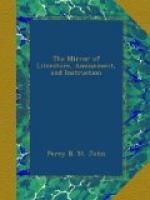“Hey? Um ’fear’d you’re a trifle ard of ’earing, arn’t you? Why then put a roasted ingin when you go to bed into your earn, and I’ll warrant ’twill cure you if you do ’t reglar.”
“O dear, no ma’am,” I replied; “indeed I’m not deaf,” with a peculiar emphasis on this last word.
“No? Well, I do declare then, I’ve been haxing you to admire this fine country for this ten minutes;—only look! ’tis a vast deal more bootiful than the road I travelled t’other day!”
So, to please the honest woman, I looked at her “fine country,” and beheld on my side the road (for we were sitting at cross corners) a stunted hedge-row, inclosing a field or two of stubble; and on hers, a sear, dismal heath, whereupon were marshalled, in irregular array, a few miserable, brown furze bushes; amongst which, a meagre, shaggy ass, more miserable still, with his hind legs logged and chained, was endeavouring to pick up a scanty subsistence. What the road of the other day could have been, it surpassed even my capacity, with this specimen of “the bootiful” before me, to surmise; but my companion was evidently one of those enviable individuals, whose ignorance is indeed their happiness, or whose imagination supplies the deficiencies of bare reality.
Shortly afterwards we took up another passenger—a “lady” also—whose figure was youthful, and whose face, perhaps, was not otherwise; but as she was weeping bitterly, her features were concealed by a white cambric mouchoir from my curious gaze. Poor creature! Had she parted from a lover?—a parent?—a child? Was she a reduced lady, quitting, for the first time and the last, her paternal home, to seek, by the exertion of her talents, or the labour of her hands, a precarious subsistence in the cold, wide world? Had she hurried from the bed of death? or, did she merely indulge in the soft sentimental sorrow, induced by Colburn’s, or Longman’s, or Newman’s last novel? Alas! the fair mourner informed us not. I felt delicate on the point of intruding upon private sorrows, and so, I presume, did my loquacious friend for she was actually silent;—albeit, I perceived that the good woman was embarrassed as to the line of conduct she ought to adopt towards the afflicted stranger. To make acquaintance with, and comfort her, was the prompting of her benevolent heart; so she put a blue glass bottle of smelling-salts into the mournful lady’s hand, which was immediately returned with a dignified, repellant bow. The basket of provisions was next offered; but this the weeping fair one, it was clear, did not see; and my honest widow, not a little disconcerted, made yet another attempt to console one who evidently “would not be comforted,” by a full, particular, and authentic relation of certain woful passages in her own monotonous life. All, however, would not do—Niobe still wept; and the widow and I felt ourselves in a very awkward, uncomfortable situation.




